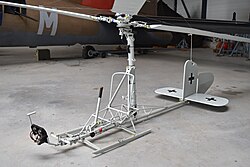Focke-Achgelis Fa 330
| Focke-Achgelis Fa 330 | |
|---|---|

|
|
| Type: | Gyroplane |
| Design country: | |
| Manufacturer: | |
| First flight: |
August 1942 |
| Commissioning: |
1943 |
| Production time: |
1943-1945 |
| Number of pieces: |
about 200 |

The Focke-Achgelis Fa 330 "Wagtail" was a motorless small gyroplane intended for use on submarines and ships.
description
The machines could start at a speed of 30 km / h. They were propelled and lifted up ( autorotation ) solely by the speed of the submarine and the wind . The structure was extremely simple and consisted of a tubular steel construction and a main rotor measuring 7.31 m in diameter , which consisted of three rotor blades.
The gyroplanes could be folded up. They were not stowed in the interior of the ships or submarines, but in two large pressure vessels (60 cm in diameter) that could be closed with watertight lids and were mounted vertically on the tower of the submarine. One of the containers contained the three rotor blades and the hub, the other fuselage structure, controls and tail unit.
The launch took place from a launch table that was mounted in the so-called winter garden of the submarine. The individual observer had a greatly increased range of vision, which should improve the location of targets. If the visibility from the tower of the submarine was usually no more than 5 nm , the observer from the wagtail could see 25 nm, as the gyroplane reached a height of approx. 120 m on the 300 m long tow rope.
It took seven minutes to get the machines ready for use on a submarine, and they were packed in two minutes. In emergencies, the pilot could drop the rotor and land with the rest of the machine hanging from a parachute . More than 112 of these simple, but technically sophisticated devices for their time were built and used on the Type IX D 2 submarines .
Around 200 copies of the Fa 330 are said to have been assembled at Weserflug in Hoykenkamp. Some of these came to Britain in 1945 and were investigated at the Airborne Forces Experimental Establishment , RAF Beaulieu. Another prototype was completed after the war in France as the SNCASO SE-3101.
Since the use of a submarine prevented the submarine from descending quickly (or required abandoning the aircraft and leaving the pilot behind), the success of the model was very limited. Subsequently, the possibility of modifying the Fa 330 into a helicopter using a 60 hp engine was examined, but it was not considered feasible. Instead, the outwardly quite similar, but largely independent Fa 336 was designed. The concept also included a 60 hp engine and a conventional tail rotor for torque compensation, but never got beyond the drawing board due to a lack of development capacities.
Technical specifications
| Parameter | Data |
|---|---|
| crew | 1 |
| Rotor circle diameter | 7.32 m |
| length | 4.42 m |
| Rotor area | 42.00 m² |
| Empty mass | 68 kg |
| Operating speed | 27-40 km / h |
Received aircraft
A number of Fa 330 have been preserved and are on display:
- Helicopter Museum Bückeburg , Germany
- German Museum of Technology Berlin , Germany
- Imperial War Museum Duxford , United Kingdom
- Musée de l'air et de l'espace , France
See also
literature
- Gerhard Freund Assumption Command "Wagtail" - The use of the non-powered Fa 330 gyroplane in the submarine war of the Second World War. Märchenstrasse-Verlag, Steinau an der Strasse 2014, ISBN 978-3-9816145-1-0 .
Web links
- More pictures and information at luftarchiv.de
- Launching a Fa 330 from a submarine (YouTube video)
- Overview of the helicopter developments from Focke-Achgelis
- http://www.nasm.si.edu/collections/artifact.cfm?id=A19540016000
- http://www.deutsches-museum.de/sammlungen/verkehr/luftfahrt/hubschrauber/bachstelze/
- https://www.modellbau-s-sauer.de/die-bachstelze/
Individual evidence
- ↑ Bert Hartmann: Focke-Achgelis Fa 330 'Wagtail'. Retrieved August 14, 2020 .
- ^ Andreas Parsch: German Military Aircraft Designations (1933–1945). Retrieved on August 14, 2020 .
- ↑ Focke-Achgelis company 336. Retrieved on August 14, 2020 .
- ↑ Peter All-Fernandez (ed.): Aircraft from A to Z . tape 2 . Bernard & Graefe, Koblenz 1988, ISBN 3-7637-5905-0 , p. 240 .
- ↑ Focke-Achgelis Fa 330 BACHSTELZE. Bückeburg Helicopter Museum, accessed on August 14, 2020 .
- ↑ Focke-Achgelis Fa 330-A-0 white wagtail. In: www.museeairespace.fr. Accessed August 14, 2020 (French).

